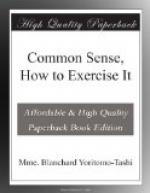“It is impossible to define the spirit of consistency more accurately.
“It is closely related to perseverance, but can not be confounded with it, because the attributes of consistency have their origin in logic and reason which does not produce one act alone but a series of acts sometimes dependent, always inferred.
“The spirit of consistency banishes all thought derogatory to the subject in question; it is the complete investiture of sentiments, all converging toward a unique purpose.”
This purpose can be of very great importance and the means of attainment multiform, but the dominant idea will always direct the continuous achievements; under their different manifestations—and these at times contradictory—they will never be other than the emanation of a direct thought, whose superior authority is closely united to the final success.
Wisdom, continued the philosopher, should be mentioned here only as the forerunner which permits us to analyze experience.
It is from this never-ending lesson which life teaches us that the wisdom of old age is learned.
But is it really necessary to reach the point of decrepitude, in order to profit by an experience, actually useless at that time, as is always a posthumous conquest.
“Is it not much better to compel its attainment when the hair is black and the heart capable of hope?
“Why give to old age alone the privileges of wisdom and experience?
“It is high time to combat so profound an error.
“Is it not a cruel irony which renders such a gift useless?
“Of what benefit is wisdom resulting from experience if it cannot preserve us from the unfortunate seduction of youth?
“Why should its beauty be unveiled only to those who can no longer profit by it?” This is the opinion of Yoritomo, who says:
“What would be thought of one who prided himself on possessing bracelets when he had lost his two arms in war?
“It is, therefore, necessary, not only to encourage young people to profit by lessons of wisdom and experience, but, still further, to indicate to them how they can accomplish the result of these lessons.
“It is certain that he who can recall a long life ought to understand better than the young man all the pitfalls with which it is strewn.
“But does he always judge of it without bias or prejudice?
“Does he not find acceptable pretexts for excusing his past faults and does he not exaggerate the rewards for excellence, which have accorded him advantages, due at times to chance or to the force of circumstances?
“Finally, the old man can not judge of the sentiments which he held at twenty years of age, unless it be by the aid of reminiscences, more or less fleeting, and an infinitely attenuated intensity of representation.
“Emotive perception being very much weakened, the integrity of memory must be less exact.




